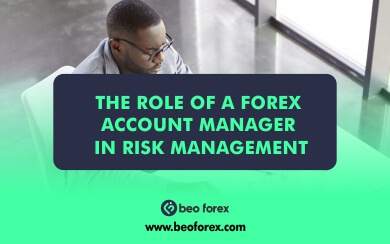The role of a Forex account manager in risk management cannot be overstated for any investor looking to invest in the foreign exchange market. Since it is unpredictable, and prices change within a short period of time, with the help of a proficient account manager, this saves your investments. These professionals know how to manage risks so that they keep your money safe, not because they know the market but also due to their experience.
An account manager in Forex is therefore quite indispensable in such a market where one may make money just as fast as losing it. They diversify investments across various assets and use strategies like stop-loss orders to protect capital from sudden market changes. They will also closely monitor your investments and change strategies where needed to keep you on course.
In this discussion about the role of a forex account manager in risk management, we will take into account what Forex account managers do, the risk management techniques used by them, and how they can help you in reaching your financial goals while reducing potential risks.
Understanding the Role of a Forex Account Manager In Risk Management
Many find the foreign exchange market an overwhelming and confusing investment platform. The forex market is the largest and most liquid in the world, with trillions traded daily. It’s no surprise that investors seek forex account managers to navigate this complex financial landscape.
A Forex account manager is a professional trader who executes trades and investments for clients in the Forex market. They possess extensive market knowledge and employ various strategies to maximize profits and minimize risks. Their role is crucial in implementing investment strategies, making it essential for anyone interested in Forex to understand their function.
The Role of A Forex Account Manager In Risk Management: Strategies
Risk management, in forex trading, becomes vital as the market shows volatility and may generate huge losses in no time. Forex account managers use a number of strategies for safeguarding their clients’ investments and maximizing the possibility of profitable results. Here are some of the crucial risk management strategies used: The Role of a Forex Account Manager in Risk Management
Stop-Loss Order Setting
The stop-loss order perhaps is one of the most rudimentary of all risk management tools. A Forex account manager uses it as an automatic process to close a trade at a certain price in order to stop further loss from occurring. It enables managers to define the level of maximum loss that may affect the client’s capital and avoid emotional decisions related to market fluctuations. This approach ensures that losses are contained and helps maintain discipline in trading.
Diversification of Investment Portfolio
One of the fundamentals in controlling risks is diversification. Most account managers spread clients’ investments in a number of currency pairs and trading strategies. They ensure that they reduce exposure to any asset or specific market event; most of these could be minimized by such strategies when there are boomerang price movements. A well-diversified portfolio could have overall stability, which may then offer far more consistent returns over some time.
Techniques for Sizing Positions
Position sizing determines the optimal capital for each trade based on an investor’s risk tolerance and trade characteristics. Thus, forex account managers play a crucial role in calculating position sizes to minimize potential losses. This strategy balances risks and rewards, allowing for effective capital management while maximizing profits.
Market Conditions and Economic Indicators – Monitoring
Forex account managers constantly monitor market conditions and economic indicators that may impact the prices of currencies. The managers stay updated with world economic news, geopolitical events, and monetary policy changes in order to make necessary decisions concerning trading. This proactive stance aids in locating any potential risks and capturing trading opportunities in a timely manner.
Regular Review and Trading Plan Revisions
Risk management is a continuous process where forex account managers revisit trading plans based on performance against changed market scenarios. This involves past trade analysis, trading risk exposure analysis, and modification in strategies where required. The regular reviews ensure that the trading approach is appropriate to the client’s investment goals and their risk tolerance.
Ensuring a Good Risk-to-Reward Ratio
Risk management means keeping a good risk-to-reward ratio on the trades. In this manner, Forex account managers will try to ensure that potential rewards far outstrip risks taken. Emphasizing high-probability setups with good risk-to-reward ratios will increase the probability of profitable outcomes and minimize the potential for huge losses.
Setting Proper Investment Goals and Risk Tolerance
To begin with, forex account managers clearly set investment objectives and establish the client’s risk tolerance before they assume management of a client’s account. Understanding the client’s financial objectives and risk appetite will therefore allow the manager to apply strategies variably. This in essence creates a situation where the risk management strategies implemented are commensurate with the expectations and comfort levels of the client.
Frequently Asked Questions (FAQs)
Why is risk management so important?
It is always a good thing to have forex risk management strategies before trading. Successful traders are the ones who realize and understand that to trade, such a complicated activity requires an overall forex risk management strategy and a trading plan.
Adopt risk management in investment to avoid losses when the market happens to be opposite of what was expected. Instead of considering every given opportunity at an equal scale, analyze the risk involved in it and only pursue those opportunities that seem most likely to work out.
What is the best risk management strategy for Forex?
Among the best risk management strategies in forex are the performance of stop-loss orders. Stop-loss orders assist traders in defining their comfort zone, restricting them to their maximum loss. This takes away the doubt and emotion from the trading and larger losses.
Can Someone Manage My Forex Account?
You can outsource your Forex account management if it’s complex or time-consuming, but make sure to choose an experienced and knowledgeable service. Also, check reviews from other customers that used their services.
How does it work in Forex account management?
When you open a managed forex trading account, usually the account manager-or sometimes a team of traders-is going to trade your capital, together with other investors’ capital, by selling and buying currencies. They have discretionary power over the funds in that they can make whatever decisions without consulting you. They will normally charge a performance fee and take money only when they make money for you.
























